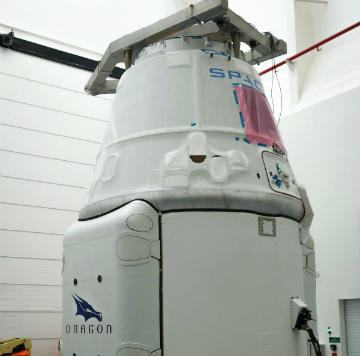
Section Branding
Header Content
After The SpaceX Explosion, What's Next For The Private Space Industry?
Primary Content

Plans to privatize the U.S. space program have been grounded following this weekend’s explosion of a Space X rocket.
The unmanned Falcon 9 rocket, which was on its way to resupply the International Space Station, blew up about two minutes after its launch on Sunday. It is the third setback in less than a year for flights that are meant to bring more food, equipment and scientific experiments to the ISS, but it’s also renewing questions about the role politics and policy are playing with the space program. GPB's Bradley George talks about the future of private space flight with sci-tech correspondent Renay San Miguel.
· Give us some background on Space X and what may have happened to its rocket on Sunday. If you look at the video, it seems like everything was going well after about a couple of minutes into the launch.
And there was so much pressure on this particular launch following the April failure of a Russian Progress cargo vehicle that spun out of control shortly after making orbit, and last October’s explosion of a Space X competitor’s rocket mere seconds after its launch. Space X is famed tech entrepreneur Elon Musk’s other company besides Tesla, and it’s one of two private firms that have contracted with NASA for building and delivering a reusable rocket that would take the place of the now-discontinued Space Shuttle. Right now NASA is paying a lot of money to the Russian Space Agency each time a U.S. astronaut has to hitch a ride on a Soyuz rocket to the ISS, so they want to find other alternatives quickly. Space X builds not only the Falcon rocket but a Dragon cargo ship. There’s no official word on what happened Sunday but Musk tweeted out that the problems started right after the Falcon’s first stage rockets shut down.
· That’s three disastrous missions now to resupply ISS. What does this mean for the crew of astronauts that are there now? Is there any danger of them running out of food or other supplies?
Spokespeople say they always plan for these contingencies and have enough food, water, etc. to get them through the fall. But other things were lost in the Falcon 9 explosion besides 4,000 pounds of food – namely, a kind of docking adapter for the ISS that would have allowed other types of space vehicles to connect to it. There’s another Russian Progress supply flight planned this weekend, and a Russian crew scheduled to join the 3 astronauts there already later next month. The Japanese will send a rocket in August and then Space X is set to try another supply flight in September. But another Space X launch of a Falcon 9 rocket on August 9th that was set to put a new earth observation satellite into orbit is now delayed as the company investigates Sunday’s incident.
· You mentioned contingencies, and NASA is famous for having backups upon backups for its projects. So why does it find itself suddenly worrying about how it’s going to get people and supplies into space?
There’s an editorial in Monday’s Wall Street Journal from retired U.S. Air Force general William Shelton, who ran the U.S. Space Command from 2011-2014, that lays out the situation. He argues that intentions to punish Russia over the invasion of the Ukraine are putting future launches of national security satellites in jeopardy. NASA currently uses Delta IV and Atlas V rockets from United Launch Alliance, which is run by Boeing and Lockheed Martin, and their rockets have a perfect track record. Most of those are the ones used to send spy satellites into orbit. But those rockets also use Russian-made engines, which has riled lawmakers looking to gain leverage over Moscow. Space X has been very good about lobbying the government to try its rockets, saying they can save the U.S. money. So lawmakers passed a bill last year that banned Russian engines in future flights, and Shelton argues that leaves no backup plans for the military besides relying on private contractors who are now having trouble getting their rockets certified. New legislation now in Congress gives officials the right to temporarily rescind that ban, but the Senate version limits how many Russian engines they can buy, and that would basically ground the Atlas rockets.
· Other things were lost in Sunday’s explosion besides 4,000 pounds of food – namely, a kind of docking adapter for the ISS. How problematic is that for the space station?
The new International Docking Adapters that were on board the rocket are supposed to work with the new Dragon cargo vehicle and another cargo ship being built by Boeing, the other private contractor. The crew on board now was supposed to do some spacewalking to make those connections fit, and now that’s off the agenda and behind schedule. Also, three space experiments designed by middle and high school students in the U.S. were lost, and those students fought their way through various levels of competition to make the final cut. Here’s the potential biggest impact: last week you and I spoke about all the unmanned probes making great progress throughout the solar system – the Philae lander, the New Horizon spacecraft nearing Pluto, and a planned visit to Jupiter’s moon Europa. NASA wanted to save money with privatizing low-orbit travel so it could spend more on these unmanned deep space probes, so it hopes that Space X and these other companies can fix their problems in a hurry and successfully
Read more about the loss of the SpaceX rocket in this list of frequently asked questions from NASA.
Tags: sci-tech-now georgia, SpaceX
Bottom Content

